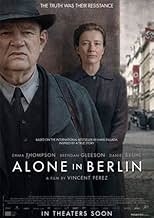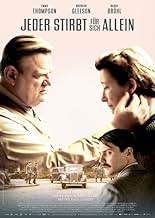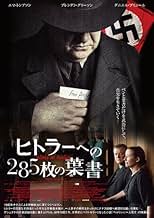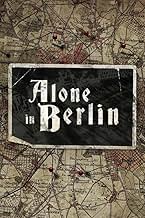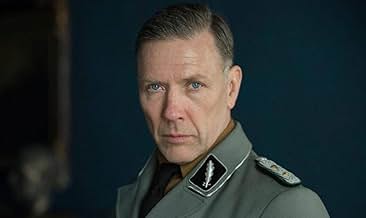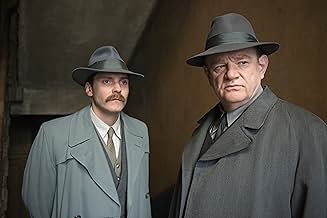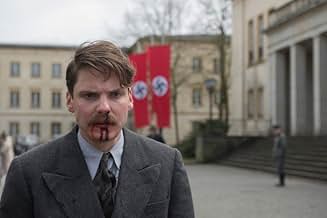AVALIAÇÃO DA IMDb
6,5/10
10 mil
SUA AVALIAÇÃO
Depois de um casal da classe trabalhadora nazi alemã perder o filho na Segunda Guerra Mundial, decidem retaliar, distribuíndo secretamente cartas manuscritas em Berlim denunciando o seu gove... Ler tudoDepois de um casal da classe trabalhadora nazi alemã perder o filho na Segunda Guerra Mundial, decidem retaliar, distribuíndo secretamente cartas manuscritas em Berlim denunciando o seu governo.Depois de um casal da classe trabalhadora nazi alemã perder o filho na Segunda Guerra Mundial, decidem retaliar, distribuíndo secretamente cartas manuscritas em Berlim denunciando o seu governo.
- Direção
- Roteiristas
- Artistas
- Prêmios
- 3 indicações no total
Joachim Bißmeier
- Fromm
- (as Joachim Bissmeier)
Avaliações em destaque
This is not a happy story. It is story that opens your eyes. We have talked about it a lot since. We felt like it was something that should be seen. I would recommend it for folks curious about that era and that place in time. It seems impossible now, but you know its not. Real life stories like this tell something more for me than the big picture story.
This film tells the story of a German middle aged couple, who lost their only son in the second world war. They start a postcard writing campaign, and leave anti government messages all around Berlin.
"Alone in Berlin" shows two seemingly insignificant individuals who risk their lives because they believe that they could change the society. The acting is very good, Emma Thompson and Brendan Gleeson are really wonderful in bringing their characters alive. The brief court room scene is very moving. The ending is very good, as it is an unexpectedly fulfilling ending. I did not see that change coming. I enjoyed watching it.
"Alone in Berlin" shows two seemingly insignificant individuals who risk their lives because they believe that they could change the society. The acting is very good, Emma Thompson and Brendan Gleeson are really wonderful in bringing their characters alive. The brief court room scene is very moving. The ending is very good, as it is an unexpectedly fulfilling ending. I did not see that change coming. I enjoyed watching it.
Do you appreciate good acting? If so, you shouldn't miss "Alone In Berlin", an indie now playing at a few theaters in NYC. It features Emma Thompson and Brendan Gleeson as the Quangels, whose only son was killed in action fighting for the Nazis in WWII. They are heartbroken, but this is quickly replaced by anger and a sense of revenge for their loss. Otto (Gleeson) decides to print a series of anti-Nazi postcards and leave them at strategic public places around Berlin, but not in mailboxes or stuck in doors - that could mean death to the finder. Naturally, the Gestapo and SS are hot on his trail.
If Brendan Gleeson is the heart of the picture, Emma Thompson is its soul. She is fearful at first but then embraces Otto's dangerous idea and in the process finds renewed love for her husband. She is fiercely loyal and discovers courage she thought she didn't have. She is heartbreaking in her anguish over the loss of her son, and she and Gleeson elevate a pedestrian story to a must-see.
I wonder if at some point in production someone, in the old Hollywood tradition, should have yelled "Get me rewrite!", as the screenplay could have used a little 'punching up'. The story lacks some tension and suspense and relies on the two principals for success. And do they deliver. "Alone in Berlin" will be lost in the shuffle next year at Oscar time, which is a loss and a shame as both are deserving of an AA nom.
If Brendan Gleeson is the heart of the picture, Emma Thompson is its soul. She is fearful at first but then embraces Otto's dangerous idea and in the process finds renewed love for her husband. She is fiercely loyal and discovers courage she thought she didn't have. She is heartbreaking in her anguish over the loss of her son, and she and Gleeson elevate a pedestrian story to a must-see.
I wonder if at some point in production someone, in the old Hollywood tradition, should have yelled "Get me rewrite!", as the screenplay could have used a little 'punching up'. The story lacks some tension and suspense and relies on the two principals for success. And do they deliver. "Alone in Berlin" will be lost in the shuffle next year at Oscar time, which is a loss and a shame as both are deserving of an AA nom.
War films are stories writ large about aggression between nations. Few of them explore small-scale human undercurrents of suppressed dissent inside the countries at war. Alone in Berlin (2016) does this by looking at an ordinary working-class couple and their compulsion to express feelings about Hitler's dictatorship at time where dissent meant certain death. It is also an essay on parental grief struggling to voice its pain of loss.
Based on real events, the story opens in a small flat in Berlin where Otto Quangel (Brendan Gleeson) and his wife Anna (Emma Thompson) learn that their son has died in battle. In a long marriage that is under strain, the news pushes them further apart as they cannot console each other in grief. Otto had encouraged his son to join the Nazi army and now Anna blames him for their loss. Desperate to voice his rage against Hitler's regime, he painstakingly writes postcards and secretly leaves them on stairwells and doorways where they can be seen by passers-by: he calls them "small grains of sand in Hitler's machine". Initially he keeps Anna away from his dangerous mission, but she insists on being involved and they both become clandestine resistance fighters whose weapons are simple messages about the evils of Nazism. They manage to write and distribute over 260 cards despite extensive investigative efforts to stop them. In the process, they resurrect their marital relationship. After almost two years of card-writing they are caught and together face Nazi justice.
This film has two parallel narratives that start in opposition and end in convergence: one is Otto and Anna's actions, the other is the investigation. The first is focused on the smallness of the couple's actions in contrast to the enormous risk they are taking, like a pair of mice squeaking at roaring lions. The filming, colour palette and period setting are drab and lifeless; the atmosphere is paranoid with suspicion and mistrust; and the acting is subdued and understated. Brendan Gleeson and Emma Thompson are actors with broad performance repertoires but here they are minimalist in expression and Spartan in dialogue, with much being conveyed through furtive glances or avoided eye-contact. It is a slow-moving story, observant of small details in an alienated world. This has the effect of amplifying the intensity of Otto and Anna's actions. Close-ups of a pen leaving a trail of outrage on a small white card become powerful portraits of bravery that are ultimately futile as most of the cards were handed in to authorities. The couple's nemesis is a young German investigator (Daniel Bruhl) who pursues his work with ideological fervour for the Fuhrer but whose success turns into the film's most devastating moments of despair.
This is a joyless story about humble heroism. Otto and Anna are emblematic of ordinary people dealing with tragedy and anger inside a world of fear and danger. Far from being mere victims, their small protests seriously unsettled the Nazi hierarchy and the closing scenes are a tribute to the power of their "small grains of sand".
Based on real events, the story opens in a small flat in Berlin where Otto Quangel (Brendan Gleeson) and his wife Anna (Emma Thompson) learn that their son has died in battle. In a long marriage that is under strain, the news pushes them further apart as they cannot console each other in grief. Otto had encouraged his son to join the Nazi army and now Anna blames him for their loss. Desperate to voice his rage against Hitler's regime, he painstakingly writes postcards and secretly leaves them on stairwells and doorways where they can be seen by passers-by: he calls them "small grains of sand in Hitler's machine". Initially he keeps Anna away from his dangerous mission, but she insists on being involved and they both become clandestine resistance fighters whose weapons are simple messages about the evils of Nazism. They manage to write and distribute over 260 cards despite extensive investigative efforts to stop them. In the process, they resurrect their marital relationship. After almost two years of card-writing they are caught and together face Nazi justice.
This film has two parallel narratives that start in opposition and end in convergence: one is Otto and Anna's actions, the other is the investigation. The first is focused on the smallness of the couple's actions in contrast to the enormous risk they are taking, like a pair of mice squeaking at roaring lions. The filming, colour palette and period setting are drab and lifeless; the atmosphere is paranoid with suspicion and mistrust; and the acting is subdued and understated. Brendan Gleeson and Emma Thompson are actors with broad performance repertoires but here they are minimalist in expression and Spartan in dialogue, with much being conveyed through furtive glances or avoided eye-contact. It is a slow-moving story, observant of small details in an alienated world. This has the effect of amplifying the intensity of Otto and Anna's actions. Close-ups of a pen leaving a trail of outrage on a small white card become powerful portraits of bravery that are ultimately futile as most of the cards were handed in to authorities. The couple's nemesis is a young German investigator (Daniel Bruhl) who pursues his work with ideological fervour for the Fuhrer but whose success turns into the film's most devastating moments of despair.
This is a joyless story about humble heroism. Otto and Anna are emblematic of ordinary people dealing with tragedy and anger inside a world of fear and danger. Far from being mere victims, their small protests seriously unsettled the Nazi hierarchy and the closing scenes are a tribute to the power of their "small grains of sand".
this is not a terrible movie, but it's hard to capture to real terror of Nazism. the book is a tough read but it's as near as I've seen to reality. the total fear of carrying out even the most trivial oppositional act. the certainty that your life is endangered if anyone knows what you're doing - even if it's your family. people always think they would have been in the resistance, but likely they wouldn't. this movie does a reasonable job of showing that only those with nothing to lose would even think about it.
Você sabia?
- CuriosidadesBased on the novel "Jeder stirbt für sich allein" (Every Man Dies Alone) by Hans Fallada. The novel was allegedly based on Gestapo files to which Fallada was given access.
- Erros de gravaçãoEmma Thompson wears her wedding ring on her left hand. Germans, both men and women, wear them on their right hands. The German actor who plays Judge Fromm correctly wears his wedding ring on this right hand.
- Citações
Otto Quangel: What more can a man donate than his child?
- ConexõesVersion of Jeder stirbt für sich allein (1962)
Principais escolhas
Faça login para avaliar e ver a lista de recomendações personalizadas
- How long is Alone in Berlin?Fornecido pela Alexa
Detalhes
- Data de lançamento
- Países de origem
- Central de atendimento oficial
- Idioma
- Também conhecido como
- Alone in Berlin
- Locações de filme
- Empresas de produção
- Consulte mais créditos da empresa na IMDbPro
Bilheteria
- Faturamento bruto nos EUA e Canadá
- US$ 33.125
- Fim de semana de estreia nos EUA e Canadá
- US$ 8.869
- 15 de jan. de 2017
- Faturamento bruto mundial
- US$ 1.205.598
- Tempo de duração
- 1 h 43 min(103 min)
- Cor
- Proporção
- 2.35 : 1
Contribua para esta página
Sugerir uma alteração ou adicionar conteúdo ausente


